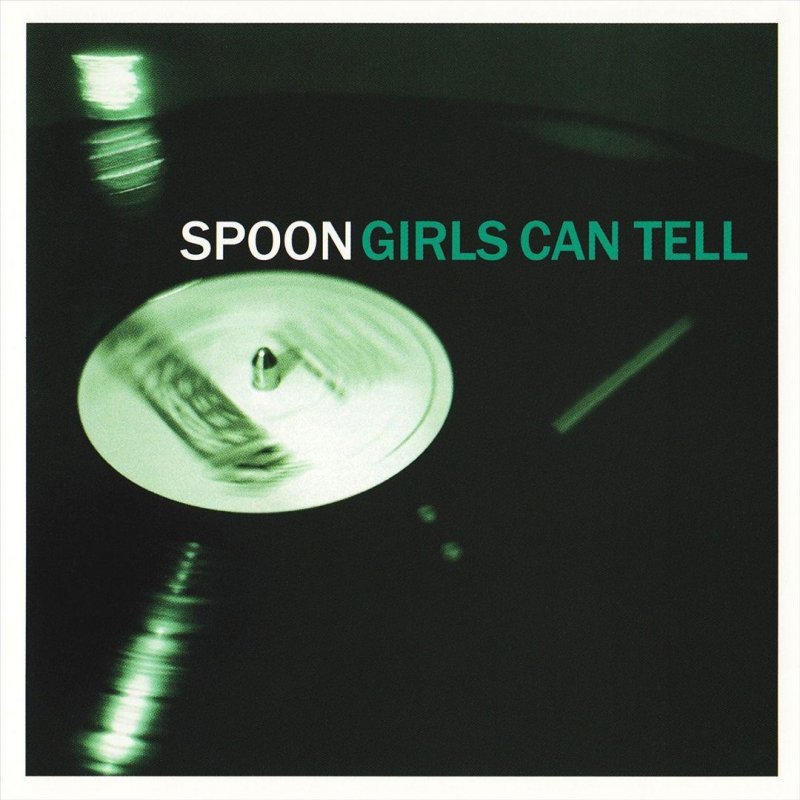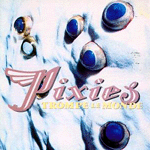Spoon : Girls Can Tell

The Spoon of the ’90s and the Spoon of the ’00s sound almost as if they’re two completely different bands. With Telephono, the Austin-based group had emerged as a scrappy indie rock combo, unpolished, concerned with punk ferocity as much as pop songcraft, but, most of all, concerned with rawness. With a major label leap to Elektra for the release of second album A Series of Sneaks, Spoon had compressed the sound of Telephono into tighter, even more strongly constructed pop nuggets that made little impact upon release, but the Pixies-like brevity, get-in/tear-it-up/get-out approach heard therein resulted in the album later being heralded as the group’s first masterpiece. As with most of the indie rock major label signings in the ’90s, Spoon didn’t last long on Elektra and were left without a label for a few years, thus creating the dilemma of where to turn next. Left in commercial limbo, Spoon continued to play shows, and commenced recording album number three, without label support, and without a timeline. Post-Y2K, Spoon emerged a renewed and highly evolved group of musicians, re-introduced with their best album yet.
Girls Can Tell was Spoon captured, on their own terms, unhurried, taut and dynamic, but natural. As much ass as A Series of Sneaks kicks, this is where the band hit their stride, ushering in an as-of-yet unending series of amazing records, each one displaying a new, refined facet of the nearing legendary Austinites. Girls Can Tell came as quite the surprise to those expecting more of the Guided by Voices-like pop scruff of yore. This was a deeply soulful side of the band, still steeped in post-punk yet rife with bare emotions and coolly rhythmic.
It’s been noted by some that Spoon is a band known for sounding super cool, yet rarely showing an emotional depth in many of their songs. To anyone who believes this notion, Girls Can Tell should remedy them of such silly notions. Perhaps coincidental given the band’s separation with Elektra, Girls is a break-up album, its songs ringing of loneliness and desolation, of desperation and of bitterness. They’re not so much bitter tirades or cries for forgiveness, but rather subtle post-relationship musings, details sometimes spoken in abstracts, though Britt Daniel’s lyrics often cut to the chase. The album begins with “Everything Hits At Once,” which seems to tell the story right as the relationship ends. Daniel sings, “don’t say a word/ the last one’s still stinging,” making clear that things have gone sour, yet it’s not until he sings “I go to sleep alone but think that you’re next to me” that the loneliness and the impact become tangible. Strikingly subtle musically, “Everything Hits At Once” arrives with a powerful drum break before rolling into a cool, albeit restrained groove. With some mellotron courtesy of Trail of Dead’s Conrad Keely, the song’s climax comes slowly but powerfully, and what initially sounded cool and different becomes a mighty punch to the stomach, one worth taking over and over again.
With an angular, slow-burning groove, “Believing is Art” finds a less directly emotional muse, sounding more like a funkier Wire with its descending bassline and scratchy riffs. Britt Daniel adopts a more cynical tone as he sings “things everybody should know/ the end will come slow/ and love breaks your heart,” a stark contrast to the album’s opener. The mid-tempo pop of “Me and the Bean” is simpler and more straightforward, executed marvelously, of course. Interestingly enough, it is a cover of a track by fellow Austin band The Sidehackers, whose John Clayton later appeared on Spoon’s Kill the Moonlight. “Lines in the Suit” is another standout track (that makes four in a row, and it basically continues until the album ends), taking on a tight, jagged rhythm backed by an electric piano. Though not exactly a breakup song, its lyrics are heartbreaking all the same, tapping into the painful realization of being slowly killed by a soul-crushing job: “how come she feels so washed up/ at such a tender age now.” By contrast, “The Fitted Shirt” is a song about shirts that fit right, set to a “Back in Black” beat, rocking exceptionally hard, and, well, just plain sounding cool.
On “Anything You Want,” the group delves into an upbeat groove, creating a feelgood sound while still exploring the roadblocks between two people. Its keyboard hook is irresistible, its bassline deep and soulful, while its climax tugs at the heartstrings, Daniel’s voice raising as he explains “I feel so alive yet feel so alone/ cause you know you’re the one and that that hasn’t changed.” Next comes “Take a Walk,” the hard driving rock track that should have been a single, but wasn’t. Daniel sounds his most vindictive here, viciously spitting “tough break handjob broke it all right in two/ and it won’t get back together with stitches and glue/ and now that song’s been sung/ it’s just the cost of what’s been done/ the cost of taking a walk with you.” It’s as if Daniel is going through Kübler-Ross’s five stages of grief, and this, being the angry stage, is by far the most fiercely badass.
Throughout the course of the second half, there are even wider swinging styles at play. There’s the brief, acoustic “1020 AM,” the soulful Motown exercise “Take The Fifth,” and the post-punk instrumental “This Book is a Movie.” Yet, as many of my favorite albums often do, Girls Can Tell ends with its best song, the magnificent “Chicago At Night.” Having long been a set opener at Spoon’s shows, “Chicago At Night” is an essential entry in their catalogue. Though more cryptic lyrically, this song is more evocative with its dark and smoky tones. The eerie interplay of surf-inspired guitars and organ creates a haunting atmosphere, gorgeous and dripping with uneasy mood. When Daniel sings “everybody’s at disadvantage/ speaking with their second language,” the tension becomes thick and palpable, as the metaphorical “wall” in the song is erected and the two characters in the play go their separate ways off into the rainy scenery.
Spoon would continue to evolve with each album, and would continue to produce amazing song after amazing song. With Girls Can Tell, they mastered a perfect album, flowing seamlessly from one song to the next, baring emotions, allowing a common thread to weave in and out of each song, while mixing lighter moments with darker laments and woes. Not every song has the fun, lighthearted feel of those on Kill the Moonlight, or the epic arrangements of Gimme Fiction, or the manic energy on A Series of Sneaks, but each of those characteristics is present, as is an impeccable craftsmanship and flawless execution.
Similar Albums:
 Pixies – Trompe Le Monde
Pixies – Trompe Le Monde
 Wire – 154
Wire – 154
 Heatmiser – Mic City Sons
Heatmiser – Mic City Sons
Jeff Terich is the founder and editor of Treble. He's been writing about music for 20 years and has been published at American Songwriter, Bandcamp Daily, Reverb, Spin, Stereogum, uDiscoverMusic, VinylMePlease and some others that he's forgetting right now. He's still not tired of it.

